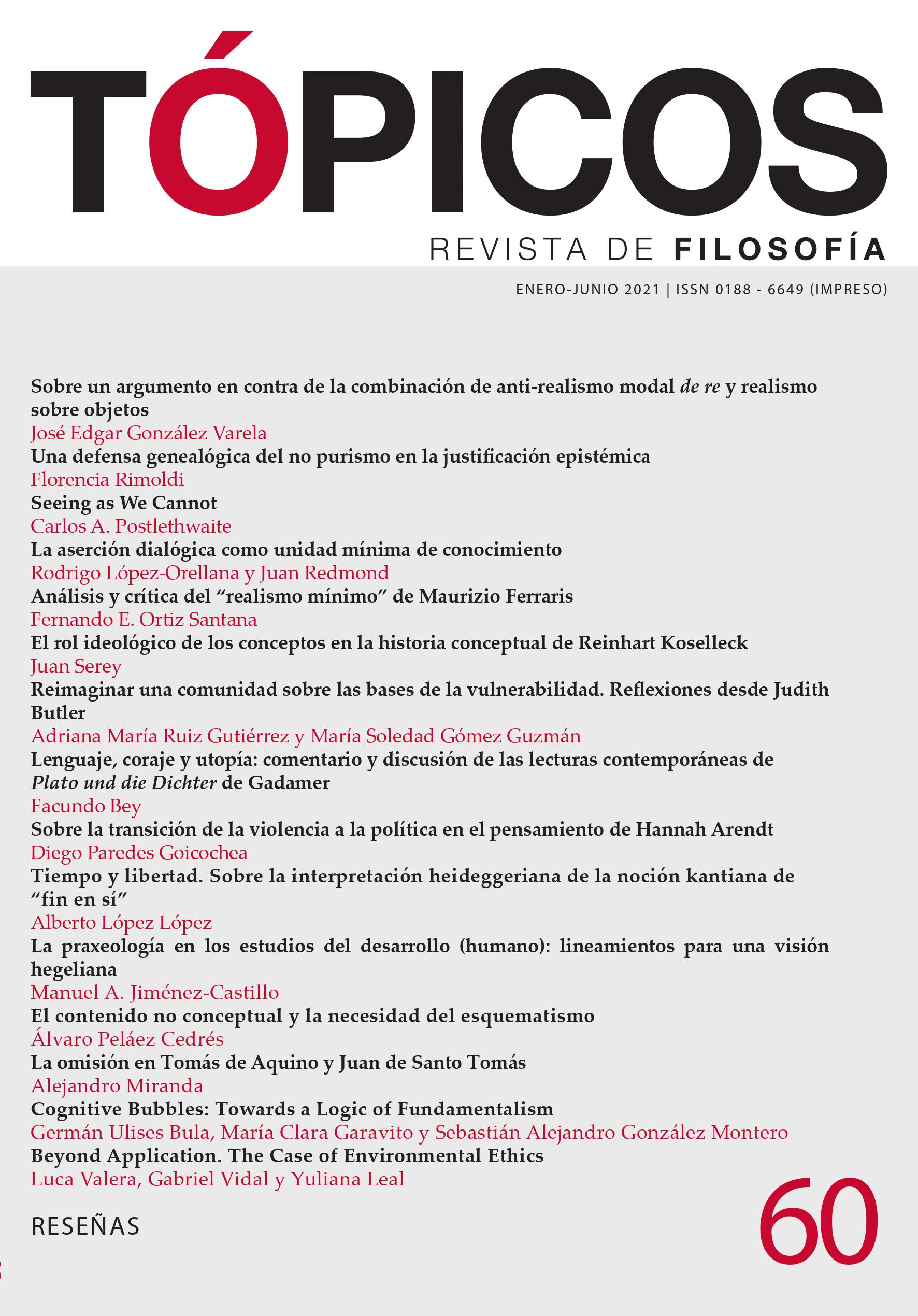Publicado 2020-10-27
Palabras clave
- historia,
- conceptos,
- ideología,
- Koselleck
Cómo citar
Resumen
En este artículo analizamos los supuestos de la historia conceptual de Reinhart Koselleck, de cara a la cual se sostiene que el orden conceptual opera a través de la constitución de campos semánticos que obtienen su contenido de los diversos horizontes de expectativas y experiencias en que se encuentran. Sin embargo, esta relación es problemática, pues Koselleck no explora el fundamento ideológico que ejerce presión desde el orden extralingüístico hacia el orden conceptual, mostrando un aspecto que afecta la constitución de la historia conceptual como disciplina que ponga en cuestión sus propios fundamentos. Por ello sostenemos que la noción de control semántico, que es ejercido por las ideologías, que determinan la primacía de ciertos contenidos semánticos sobre otros, permite poner de relieve y solucionar este problema.
Referencias
- Abellán, J. (2007). En torno al objeto de la historia de los conceptos de Reinhart Koselleck. En E. Bocardo (ed.), El giro contextual. Cinco ensayos de Quentin Skinner y seis comentarios. (pp. 215-248). Tecnos.
- Blumenberg, H. (1997). Shipwreck with Spectator. Paradigm of a Metaphor for Existence. The MIT Press.
- Eagleton, T. (1997). Ideología. Una introducción. Paidós.
- Edwards, J. (2007). The Ideological Interpellation of Individuals as Combatants: An Encounter Between Reinhart Koselleck and Michel Foucault. Journal of Political Ideologies, 12(1), 49-66.
- Eco, U. (2000). Tratado de semiótica general. Lumen.
- Freeden, M. (2017). Conceptual History, Ideology and Language. En W. Steinmetz, M. Freeden y J. Fernández (eds.), Conceptual History in the European Space. (pp. 118-138). Berghahn Books.
- Freeden, M. (1997). Ideologies and Conceptual History. Journal of Political Ideologies, 2(1), 3-11.
- Freeden, M. (1994). Political Concepts and Ideological Morphology. The Journal of Political Philosophy 2(2), 140-164.
- Freeden, M. (2000). Practicing Ideologies and Ideological practices. Political Studies, 48, 302-322.
- Gadamer, H. G. (1997). Histórica y lenguaje: una respuesta. En R. Koselleck y H. G. Gadamer, Historia y hermenéutica. (pp. 95-106). Paidós.
- Kant, I. (2006). Crítica de la razón pura. Taurus.
- Knobloch. C. (1992). Überlegungen zur Theorie der Begriffsgeschichte aus sprach- und kommunikationswissenschaftlicher Sicht. Archiv für Begriffsgeschichte, 35, 7-24.
- Koselleck, R. (1989a). Linguistic Change and the History of Events. Journal of Modern History, 61, 649-666.
- Koselleck, R. (1989b). Social History and Conceptual History. Politics, Culture, and Society, 2(3), 308-325.
- Koselleck, R. (1993). Futuro pasado. Para una semántica de los tiempos históricos. Paidós.
- Koselleck, R. (1997). Historia y hermenéutica. En R. Koselleck y H. G. Gadamer, Historia y hermenéutica. (pp. 65-94). Paidós.
- Koselleck, R. (2004). Historia de los conceptos y conceptos de historia. Ayer, 53, 27-45.
- Oncina, F. (2003). Historia conceptual, Histórica y modernidad velociferina: diagnóstico y pronóstico de Reinhart Koselleck. Isegoría, 29, 225-237.
- Palonen, K. (1997). An Application of Conceptual History to Itself. From Method to Theory in Reinhart Koselleck’s Begriffsgeschifte. Redescriptions: Political Thought, Conceptual History and Feminist Theory, 1(1), 39-69.
- Palti, E. J. (2010). From Ideas to Concepts to Metaphors: The German Tradition of Intellectual History and the Complex Fabric of Language. History and Theory, 49, 194-211.
- Palti, E. J. (2011). Reinhart Koselleck: His Concept of the Concept and Neo- Kantianism. Contributions to the History of Concepts, 6(2), 1-20.
- Pickering, M. (2004). Experience as horizon. Koselleck, Expectation and Historical Time. Cultural Studies, 18(2-3), 271-289.
- Richter, M. (1986). Conceptual History (Begriffsgeschichte) and Political Theory. Political Theory, 14(4), 604-637.
- Sheehan, J. (1978). Begriffsgeschichte: Theory and Practice. The Journal of Modern History, 50(2), 312-319.
- Schinkel, A. (2005). Imagination as a Category of History: An Essay Concerning Koselleck’s Concepts of Erfahrungsraum and Erwartungshorizont. History and Theory, 44(1), 42-54.
- Wolosky, A. (2014). La teoría y metodología de la historia conceptual en Reinhart Koselleck. Historiografías, 7, 85-100.






